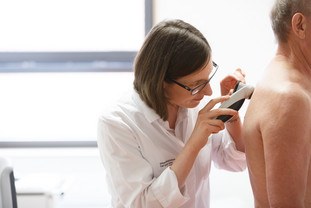Strong signal for skin cancer screening
Strong signal for skin cancer screening
Since 2008, people from the age of 35 years onwards with statutory health insurance in Germany have been entitled to a skin cancer screening examination every two years. However, the benefit of the screening is still questionable more than ten years after the start of the program. Researchers at the NCT/UCC Dresden and the Carl Gustav Carus Faculty of Medicine have discovered in a large-scale analysis of health insurance data from approximately 1.4 million insured individuals based in Saxony that screening could actually reduce skin cancer-related mortality. The results were published in the British Journal of Dermatology.
The National Center for Tumor Diseases Dresden (NCT/UCC) is a joint institution of the German Cancer Research Center (DKFZ), the University Hospital Carl Gustav Carus Dresden, Carl Gustav Carus Faculty of Medicine at TU Dresden and the Helmholtz-Zentrum Dresden-Rossendorf (HZDR).
Nationwide skin cancer screening, which was introduced in Germany in 2008, is controversial. So far, it has not been convincingly proven that it actually promotes the primary goal: to reduce mortality caused by the dangerous pigmented skin cancer - so-called melanoma. A recent study based on health insurance data from over 1.4 million insured individuals now provides evidence that screening may indeed have a positive effect on skin cancer-related mortality. "Our large-scale study provides important evidence that screening participation provides a benefit to those affected. The results suggest that screening can detect skin cancer earlier and reduce mortality in melanoma patients," said Prof. Jochen Schmitt, director of the Center for Evidence-Based Healthcare (ZEGV) at TU Dresden.
As part of the study, researchers at the NCT/UCC Dresden and the Carl Gustav Carus Faculty of Medicine analyzed health insurance data from 2010 to 2016 from approximately 1.4 million AOK PLUS policyholders based in Saxony, comparing the mortality of two patient groups who were newly diagnosed with melanoma during that time period. Individuals in group 1 had participated in a skin cancer screening at least once during the relevant period, while group 2 had not. As a result, the mortality of patients with newly diagnosed melanoma was 38 percent lower in group 1 compared to group 2. The data also showed that skin cancer was detected at earlier stages in individuals from group 1.
In the analysis, numerous differences between the two groups were eliminated that could lead to a bias in the results: for example, different compositions with regard to age, gender or selected other diseases. Only health insurance data from Saxony was analyzed, which is, however, comparable with the overall German population with regard to the distribution of important characteristics such as age or gender.
"The study is an important positive signal in the evaluation of the screening. It provides strong evidence that the national screening program is useful in the fight against skin cancer and provides a benefit to the individuals who participate. Further large-scale studies on this issue would be desirable to minimize remaining uncertainties," says Prof. Friedegund Meier, Head of the Skin Tumor Center at the NCT/UCC.
Despite all the mathematical modeling that was performed, it may still be possible that the present analysis contains statistical biases that could distort the results. "It is conceivable, for example, that healthier people are more likely to go for screening and that this factor positively influences the probability of survival in group 1," explains first author Dr. Thomas Datzmann of ZEGV. Due to the short observation period – patient survival after new diagnosis of melanoma was followed up during a maximum period of four years - it was not possible to analyze the long-term effect of the program.
Publication:
T. Datzmann, O. Schoffer, F. Meier, A. Seidler, J. Schmitt: Patients benefit from participating in the German skin cancer screening program? A large cohort study based on administrative data. In: British Journal of Dermatology. https://doi.org/10.1111/bjd.20658
Press Contact:
Dr. Anna Kraft
Nationales Centrum für Tumorerkrankungen Dresden (NCT/UCC)
Presse- und Öffentlichkeitsarbeit
Tel.: +49 (0)351 458-5548
E-Mail: anna.kraft@nct-dresden.de
www.nct-dresden.de



